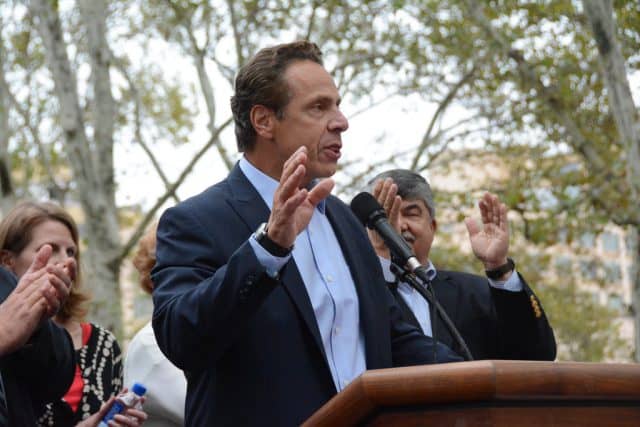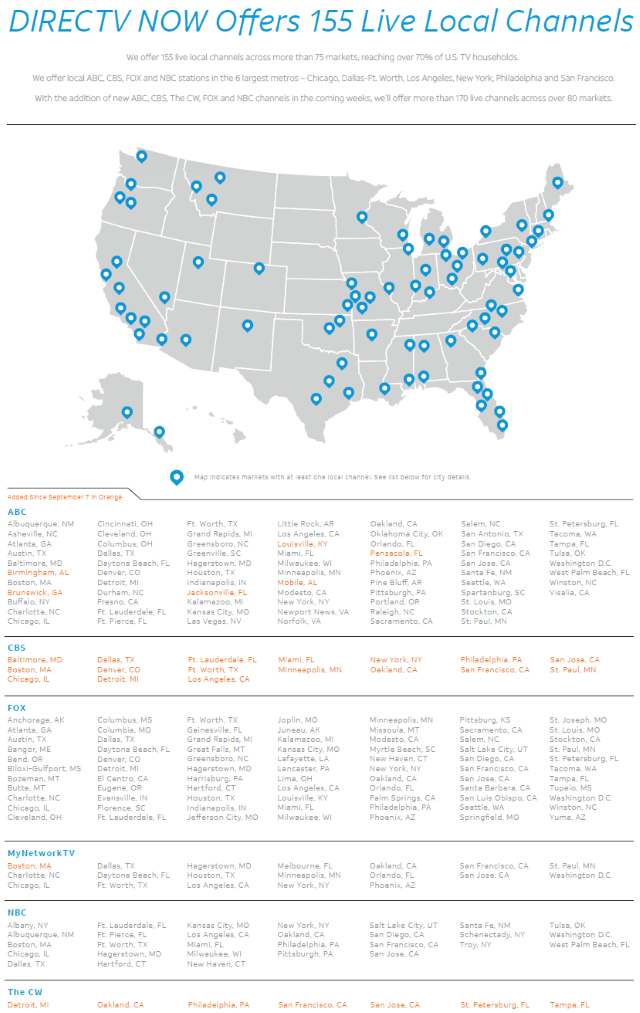
Gov. Cuomo speaking at rally in support of striking Charter/Spectrum workers. (Image courtesy: IBEW Local 3)
New York Gov. Andrew Cuomo and New York City Mayor Bill de Blasio joined thousands of union workers in Brooklyn and Manhattan on Monday to support the workers’ six-month impasse with Charter Communications.
“We do not accept a greedy corporation trying to undercut the most basic rights of working people,” Mayor de Blasio said in Manhattan, referring to Charter and its CEO Thomas Rutledge, the country’s highest paid executive in 2016, earning $98 million.
“We’re going to demand respect for the blood and sweat of the workforce,” Cuomo said in a speech to workers at Brooklyn’s Cadman Plaza Park, on the other side of the Brooklyn Bridge. The rally was attended by Charter strikers and several unions in solidarity with the cable company workers.
Nearly 1,800 Charter employees belonging to the International Brotherhood of Electrical Workers (Local 3), walked out in late March after Charter sought to kill their pension plan and move them to a less generous health care plan. They have been on strike ever since, with no sign of progress towards ending the action.
“Screwing over workers and customers seems to be a hallmark of Charter Communications’ business model,” AFL-CIO president Richard Trumka said in an earlier statement. “Charter has disrespected workers in New York who remain on strike fighting for the freedom to negotiate together to maintain their pensions and health benefits. They also continue to disregard their customers’ needs by hiking rates while providing sub par service. This is not the way to run a company, and we support all the working people standing up to these corporate bullies.”
“Charter is offering Local 3 a generous compensation package that includes an average 22-percent wage increase — some employees up to a 55-percent wage increase — and comprehensive retirement and health benefits, including a 401(k) that provides a dollar-for-dollar match up to 6 percent of eligible pay,” counters Charter spokesman John Bonomo.
 Spectrum customers in Manhattan, parts of Brooklyn, and Queens are decidedly caught in the middle, enduring more than 130 outages — some taking out service for hours, as a result of alleged repeated vandalism the company suspects is caused by striking workers. But the union notes Charter’s replacement workers are often unqualified, some taking hours to manage repairs that would “take us 10 minutes.” When Charter doesn’t have enough workers on hand to manage a repair, they call in third-party contractors. Some of them were on hand to deal with fiber optic cable cuts that took out Spectrum service for tens of thousands of customers, often in Queens and Brooklyn.
Spectrum customers in Manhattan, parts of Brooklyn, and Queens are decidedly caught in the middle, enduring more than 130 outages — some taking out service for hours, as a result of alleged repeated vandalism the company suspects is caused by striking workers. But the union notes Charter’s replacement workers are often unqualified, some taking hours to manage repairs that would “take us 10 minutes.” When Charter doesn’t have enough workers on hand to manage a repair, they call in third-party contractors. Some of them were on hand to deal with fiber optic cable cuts that took out Spectrum service for tens of thousands of customers, often in Queens and Brooklyn.
A June outage lasted almost an entire day after contractors took more than 16 hours trying to splice a cut fiber cable. Police sources blamed the striking workers.
“We would never condone that,” on-strike Spectrum technician Ray Reyes told WCBS. “We would never do that.”

A Charter employee picketing a Spectrum store.
Before the strike, Charter claims there have been only five fiber-related service outages in the last few years. Since the strike began, the company claims it has experienced 137 outages it attributed primarily to vandals. Some customers and small business owners are losing whatever sympathy they had for the striking workers.
Restaurant manager Samantha Phe has to turn away customers using credit cards every time her Spectrum internet service goes down and she is tired of being in the middle of a labor dispute.
“I think that’s a little unfair to the community,” Phe told the TV station. “Say if your company isn’t doing well for you, you’re trying to punish someone else who didn’t do anything to you.”
Many reporters in New York are barely hiding their disdain for the union and strikers, presumably because they have been affected by repeated outages as well. WCBS political reporter Marcia Kramer avoided talking to union workers in a recent report, but shouted questions to the mayor about what he feels about cable outages. She also talked to small business owners upset about the service outages.
Business owner Anthony Velez was emblematic of the level of frustration being experienced by Spectrum customers enduring repeated outages:
Velez owns Bagriculture, which was unable to conduct business when the service went out. He was also unable to access his security system, and he is furious that Cuomo and de Blasio are supporting the workers and ignoring his plight.
“I don’t think that shows the right ethics that we would look for in our mayor, or a governor,” he said.
He said politicians treat business owners as “little invisible people.”
“I don’t think there’s a lot of people who care about small business owners,” Velez said.
But not all reporters are siding with Charter.
In response to a statement from Charter blaming an outage in mid-September on “the latest round of criminal destruction of our network,” Select/All reporter Jake Swearingen asked, “Why do they always attack the aging internet infrastructure that’s been systematically underfunded for years in order to line shareholders’ pockets!”
WCBS-TV political reporter Marcia Kramer took some heat over her alleged pro-Charter positions in this story about the rally. (1:36)
 Verizon Communications will decommission its existing copper wire facilities in multiple markets in Delaware, Maryland, Massachusetts, New Jersey, New York, Pennsylvania, Rhode Island, and Virginia starting in 2018.
Verizon Communications will decommission its existing copper wire facilities in multiple markets in Delaware, Maryland, Massachusetts, New Jersey, New York, Pennsylvania, Rhode Island, and Virginia starting in 2018.

 Subscribe
Subscribe

 Spectrum customers in Manhattan, parts of Brooklyn, and Queens are decidedly caught in the middle, enduring more than 130 outages — some taking out service for hours, as a result of alleged repeated vandalism the company suspects is caused by striking workers. But the union notes Charter’s replacement workers are often unqualified, some taking hours to manage repairs that would “take us 10 minutes.” When Charter doesn’t have enough workers on hand to manage a repair, they call in third-party contractors. Some of them were on hand to deal with fiber optic cable cuts that took out Spectrum service for tens of thousands of customers, often in Queens and Brooklyn.
Spectrum customers in Manhattan, parts of Brooklyn, and Queens are decidedly caught in the middle, enduring more than 130 outages — some taking out service for hours, as a result of alleged repeated vandalism the company suspects is caused by striking workers. But the union notes Charter’s replacement workers are often unqualified, some taking hours to manage repairs that would “take us 10 minutes.” When Charter doesn’t have enough workers on hand to manage a repair, they call in third-party contractors. Some of them were on hand to deal with fiber optic cable cuts that took out Spectrum service for tens of thousands of customers, often in Queens and Brooklyn.
 T-Mobile today announced it was boosting the amount of data its “unlimited data” customers can use before they are subject to speed throttling from 32GB to 50GB, effective Sept. 20, 2017.
T-Mobile today announced it was boosting the amount of data its “unlimited data” customers can use before they are subject to speed throttling from 32GB to 50GB, effective Sept. 20, 2017. A construction crew accidentally severed a single fiber optic cable on Monday and wiped out TV, broadband, and phone service for Comcast customers in metropolitan Denver.
A construction crew accidentally severed a single fiber optic cable on Monday and wiped out TV, broadband, and phone service for Comcast customers in metropolitan Denver.